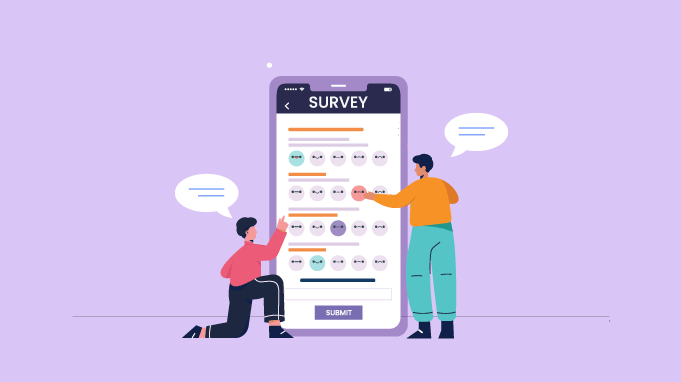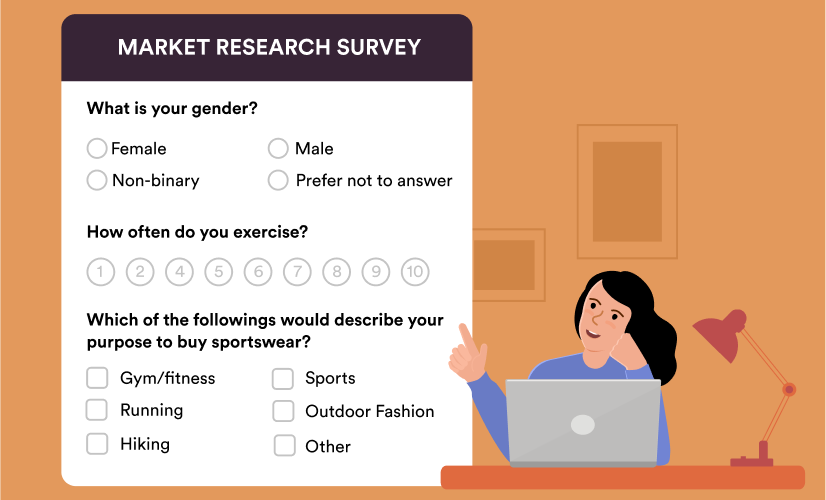Market research surveys play a crucial role in gathering valuable insights from consumers, allowing businesses to make informed decisions based on accurate data. Whether you’re launching a new product, evaluating customer satisfaction, or identifying market trends, conducting market research surveys can provide you with valuable information. In this article, we will explore the different types of market research survey examples, their components, best practices, benefits, and common challenges.
Types of Market Research Surveys

- Online surveys: Online surveys are one of the most popular and cost-effective methods of conducting market research. They can be distributed through email, social media, or survey platforms, allowing businesses to reach a wide audience quickly.
- Phone surveys: Phone surveys involve contacting respondents directly and conducting interviews over the phone. While they provide a higher response rate compared to online surveys, they can be more time-consuming and costly.
- In-person surveys: In-person surveys are conducted face-to-face with respondents. This method allows for more in-depth interviews and observations but can be limited by geographical constraints and higher costs.
- Mail surveys: Mail surveys involve sending questionnaires by mail to selected respondents. While this method can reach a diverse audience, it often has lower response rates and longer turnaround times.
Components of an Effective Market Research Survey
To ensure the success of your b2b market research survey, it is essential to consider the following components:
- Clear objectives: Define the purpose and goals of your survey. What specific information do you aim to gather? Clearly outline your objectives to focus your survey design and analysis.
- Target audience: Identify your target audience and ensure that your survey questions are tailored to their characteristics and preferences. This ensures the relevance and reliability of the data collected.
- Well-designed questionnaire: Create a well-structured questionnaire with clear and concise questions. Use a mix of question types, including multiple-choice, rating scales, and open-ended questions, to gather diverse insights.
- Proper survey distribution: Select appropriate channels to distribute your survey. Consider the characteristics of your target audience and choose channels that will maximize response rates.
- Accurate data collection: Implement mechanisms to ensure data accuracy and reliability. Validate responses, implement skip logic, and include attention-check questions to filter out invalid or inconsistent answers.
- Thorough analysis: Analyze your survey data using appropriate statistical methods and data visualization techniques. Look for patterns, trends, and correlations to draw meaningful insights.
Market Research Survey Examples

Demographic questions:
- Age: What is your age range?
- Gender: How do you identify your gender?
- Income: What is your annual household income?
Attitudinal questions:
- Likert scale: On a scale of 1 to 5, how satisfied are you with our product?
- Net Promoter Score (NPS): How likely are you to recommend our brand to a friend or colleague?
Product feedback questions:
- Features: Which product features do you find most valuable?
- Improvements: What changes or additions would you like to see in our product?
Brand perception questions:
- Brand association: What words or phrases come to mind when you think of our brand?
- Brand differentiation: How do you perceive our brand compared to our competitors?
Customer satisfaction questions:
- Overall satisfaction: How satisfied are you with your recent purchase?
- Customer service: How would you rate the helpfulness of our customer support team?
Best Practices for Conducting Market Research Survey Examples
To ensure the success of your market research survey, follow these best practices:
- Preparing survey objectives: Clearly define the purpose of your survey and what you intend to achieve.
- Defining target audience: Identify the specific characteristics and preferences of your target audience to tailor your survey questions accordingly.
- Designing effective survey questions: Use clear and concise language, avoid leading or biased questions, and consider the order and flow of your questions.
- Determining sample size: Calculate the appropriate sample size based on statistical significance and desired confidence level.
- Selecting appropriate survey distribution methods: Choose channels that align with your target audience’s preferences and ensure maximum reach and response rates.
- Analyzing and interpreting survey data: Use statistical analysis tools and visualization techniques to identify trends and patterns in your data.
- Taking action based on survey results: Use the insights gained from your survey to inform decision-making, improve products, and enhance customer experiences.
Benefits of Market Research Surveys

Conducting market research surveys offers several benefits for businesses:
- Understanding customer needs and preferences: Surveys help identify customer preferences, allowing businesses to develop products and services that better meet their target audience’s needs.
- Identifying market trends and opportunities: Surveys can reveal emerging trends and market gaps, providing valuable insights for businesses to stay ahead of their competition.
- Improving product development and marketing strategies: Survey feedback helps companies refine existing products, introduce new features, and develop more effective marketing campaigns.
- Enhancing customer satisfaction and loyalty: By addressing customer concerns and preferences, businesses can improve overall customer satisfaction and foster customer loyalty.
- Gaining a competitive advantage: Effective market research surveys provide businesses with a competitive edge by helping them make data-driven decisions and understand their target market better.
Common Challenges in Market Research Survey Examples
When conducting market research surveys, businesses may encounter the following challenges:
- Low response rates: Getting respondents to complete surveys can be challenging. Designing engaging surveys, offering incentives, and choosing the right distribution channels can help improve response rates.
- Bias and sampling errors: Ensure your sample represents your target population accurately to avoid sampling bias. Biased responses can lead to inaccurate and unreliable insights.
- Data quality issues: Incomplete or inconsistent responses can compromise the quality of your data. Implement validation checks and attention-check questions to ensure data accuracy.
- Interpretation difficulties: Analyzing survey data can be complex, and misinterpreting results can lead to incorrect conclusions. Seek the assistance of data analysts or market researchers to ensure accurate interpretation.
- Time and cost constraints: Conducting comprehensive market research survey examples requires time, effort, and resources. Balancing the need for detailed insights with time and budget constraints is crucial.
Conclusion
Market research surveys provide businesses with valuable insights into customer preferences, market trends, and competitive landscapes. By following best practices, designing effective questionnaires, and analyzing data accurately, businesses can leverage survey data to make informed decisions and gain a competitive edge. Despite challenges, market research surveys offer numerous benefits, including improved product development, enhanced customer satisfaction, and better marketing strategies. Start conducting your market research surveys today and unlock the power of customer insights.
Ready to take your market research to the next level? Request a demo from Aim Technologies and discover how our advanced survey platform can help you gather actionable insights.
FAQs
What is the purpose of a market research survey?
- Market research surveys help businesses gather data and insights about their target audience, market trends, and customer preferences. They inform decision-making, product development, and marketing strategies.
How can I ensure high response rates for my survey?
- To improve response rates, make your survey engaging, keep it concise, offer incentives, choose appropriate distribution channels, and personalize your communication with respondents.
Can market research surveys be conducted internationally?
- Yes, market research surveys can be conducted internationally. However, cultural differences, language barriers, and varying preferences may require tailoring the survey approach to each target audience.
What are some popular online survey platforms?
- Some popular online survey platforms include SurveyMonkey, Google Forms, Typeform, and Qualtrics. These platforms offer user-friendly interfaces, data analysis features, and survey distribution options.
How often should market research surveys be conducted?
- The frequency of market research surveys depends on various factors, including industry dynamics, product life cycles, and customer preferences. Regular surveys can help track changes in customer needs and market trends, ensuring businesses stay informed and adaptable.




